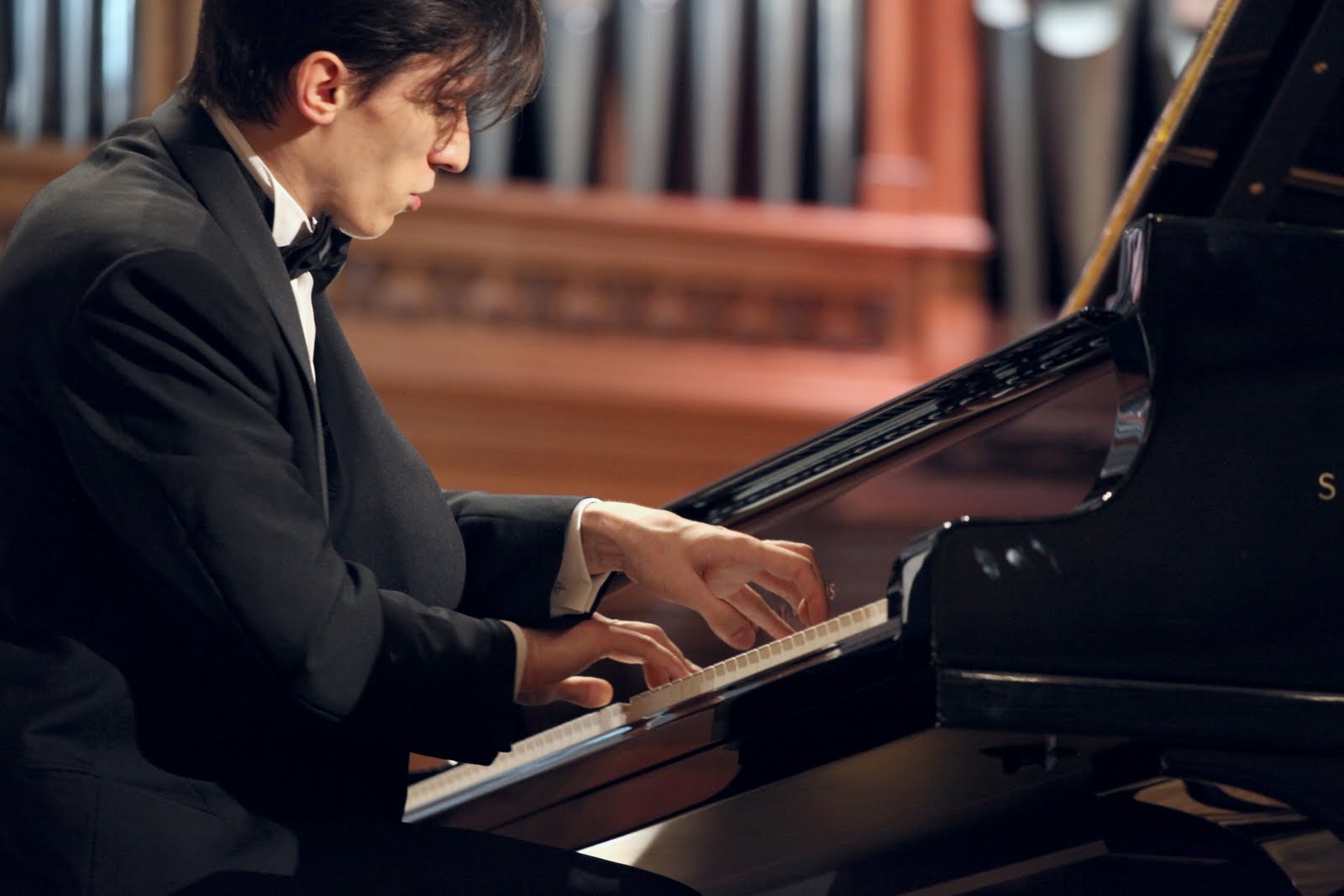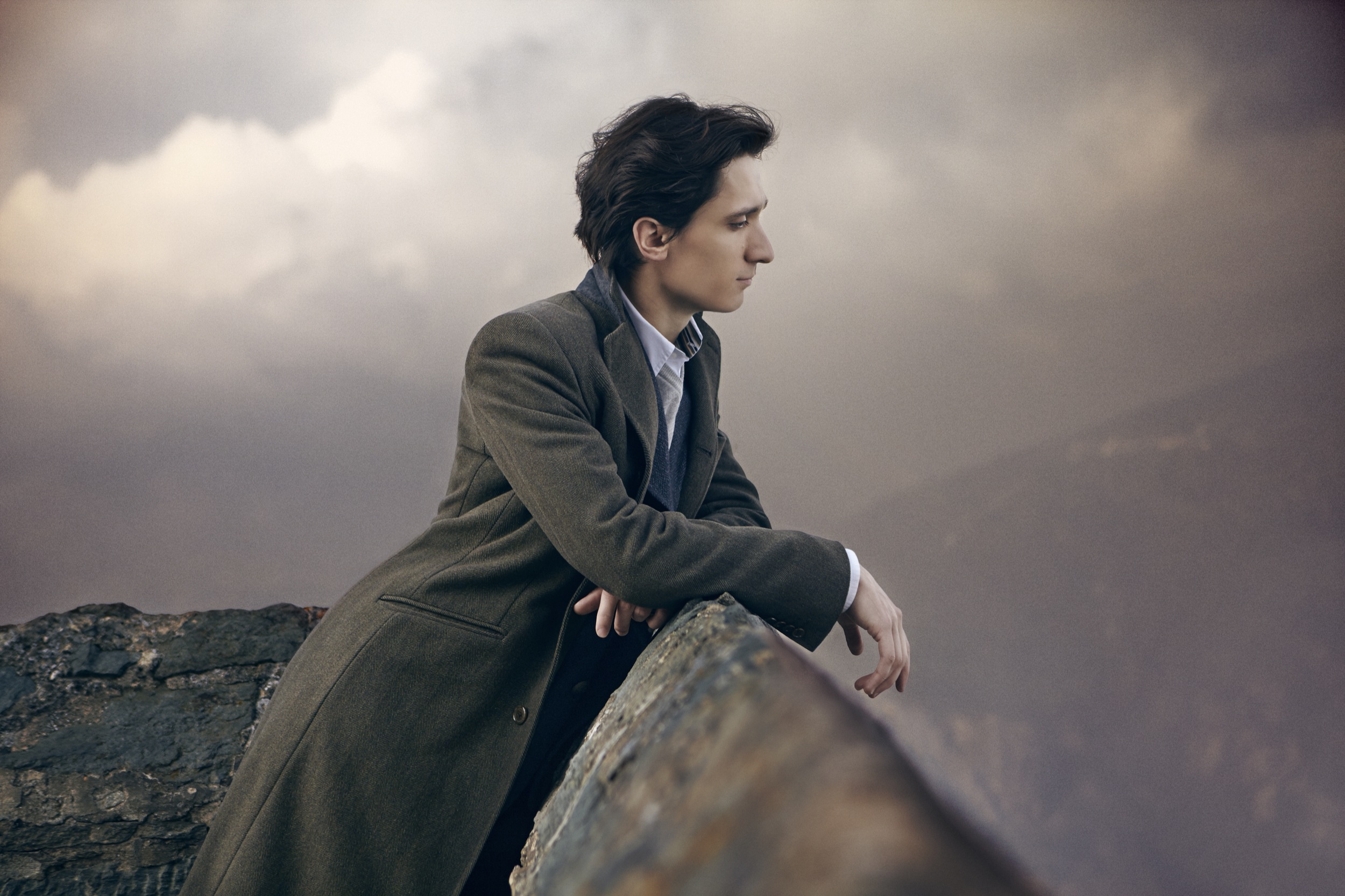Interview: Pianist Alexander Romanovsky to make Pacific Symphony debut with Prokofiev’s Second Concerto
By TIMOTHY MANGAN
Alexander Romanovsky is a Ukrainian pianist who lives in southern Switzerland, near Lugano, about 400 meters from the Italian border. When he goes jogging in the morning he likes to venture into the neighboring country, the border guards not even bothering to stop him. “No, they know me already,” Romanovsky says with a smile.
The pianist was speaking recently on Skype, where his image fluctuated between ghostly and frozen but where generally his talk came through. He isn’t well known in the U.S. yet, having played here but little. (He has appeared with the New York Philharmonic at the Bravo! Vail Festival and with the Chicago Symphony at Ravinia.) He’ll be making his California debut with Carl St.Clair and Pacific Symphony in concerts Feb. 1-4 at Segerstrom Concert Hall.
Romanovsky and St.Clair are well acquainted though. The two met for the first time in Costa Rica a couple of years ago when the pianist came to perform Rachmaninoff’s Third Piano Concerto with the National Symphony Orchestra there, for which St.Clair serves as music director.
“Immediately we felt something really special,” Romanovsky says. “I felt my ease with him as a musician, but more than that it was him as a person.” They got together a second time in December, again in Costa Rica, when they continued their discussions of music and life and collaborated on Prokofiev’s Piano Concerto No. 2, a piece they’ll reprise in Costa Mesa.
Born in 1984, Romanovsky revealed his talents early and has a remarkable blurb in his official biography because of it. The legendary conductor Carlo Maria Giulini (1914-2005) called him “extraordinarily gifted” after hearing Romanovsky play when he was 14.
“I was playing concert in Vicenza and maestro Giulini came to listen to that concert,” Romanovsky recalled. “Then we had dinner together,” a thrill for the young musician. “I remember this very tall, very noble guy who was not much for words, but very very fascinating, very aristocratic.”
 Romanovsky had moved to Italy when he was 13, following his teacher, Leonid Margarius, to study with him at the Imola Piano Academy. He later studied a the Royal College of Music in London with Dmitry Alexeev, earning an artist diploma. At age 17, he won first prize at the prestigious Ferruccio Busoni International Competition in Italy, joining such luminaries as Martha Argerich, Garrick Ohlsson, Ursula Oppens and Louis Lortie. Since 2007, he has made four recordings for Decca, including most recently in 2017, “Childhood Memories,” a collection of shorter works by Liszt, Chopin, Rachmaninoff and others.
Romanovsky had moved to Italy when he was 13, following his teacher, Leonid Margarius, to study with him at the Imola Piano Academy. He later studied a the Royal College of Music in London with Dmitry Alexeev, earning an artist diploma. At age 17, he won first prize at the prestigious Ferruccio Busoni International Competition in Italy, joining such luminaries as Martha Argerich, Garrick Ohlsson, Ursula Oppens and Louis Lortie. Since 2007, he has made four recordings for Decca, including most recently in 2017, “Childhood Memories,” a collection of shorter works by Liszt, Chopin, Rachmaninoff and others.
Romanovsky estimates that he plays between 60 and 70 concerts a year, mostly in Europe and Asia. Since 2014, he has also been artistic director of the Vladimir Krainev Moscow International Piano Competition, “a huge competition for young pianists” that he won when he was 11 years old.
Since taking over, Romanovsky has made a number of changes to the competition, including moving it from a contentious region of Ukraine to Moscow and having all jury voting made public. “Obviously, I know the competition world from the other side, as a competitor,” Romanovsky says. “So when I had the right to take some decisions, I obviously keep in mind how I was dreaming of competition when I was a competitor.”
Another of his concerns is social inequality, and how it relates to the competition. For some, he says, the expense of traveling to Moscow to participate in the competition is no problem at all. For others, though, it can be a barrier to compete. Paying the expenses of hundreds of competitors to come to Moscow proved too onerous, so Romanovsky has instituted a small, traveling jury, to audition young pianists where they live. So far they have been to Tokyo, to Beijing, to Korea, Switzerland and Armenia, as well as different cities in Russia. He plans to extend these auditions even further, including into the U.S.
Romanovsky is the kind of pianist who seems fearless in the face of gigantic musical challenges such as Prokofiev’s Piano Concerto No. 2, often considered the most difficult in the repertoire. He agrees that it’s hard to play, in some ways, but at the same time is well written for the keyboard — eminently doable, in other words.
“The initial approach to the work is very difficult, absolutely,” he says. “Because of the scale. If you want to build a huge skyscraper, obviously it’s not a joke, it’s hard work. But it’s absolutely not impossible. So if you approach it with due attention, with due expectation, then you, little by little, build your skyscraper.”
One of the highlights of the piece is a massive first movement cadenza that takes over the proceedings some six minutes in. Prokofiev marks the climax of the cadenza “Colossal.” It’s not a cadenza for the easily intimidated.
“To tell you the truth, I really enjoy playing it,” Romanovsky says. “Obviously I like this sense of a huge, huge building of tension. I’m not really thinking when I’m playing. This is a very special state when you’re playing, which is on one side you are feeling things, on the other side you are controlling things, and all this goes on the very edge of consciousness. It’s a little bit like when you are, I don’t know, riding a bicycle. You are not really thinking about how to ride it, but at the same time you have a sense of control. So when I play this cadenza, I think of the final point when I want to arrive and I’m trying to control this in the same time enjoying it.”
The pianist realizes that any day he plays this Prokofiev concerto he has to pace himself, and peak at the performance. An afternoon nap is definitely a must, he says. It puts him in optimum shape for the challenge.
“Because people they come to the concerts and they want to go to another world, they want something incredible to happen,” he says. “And they are right because otherwise why are you on the stage? If you do some common things, you don’t have to be on the stage.”
- Pacific Symphony
- With: Alexander Romanovsky, piano; Carl St.Clair, conductor
- Where: Renee and Henry Segerstrom Concert Hall
- When: 8 p.m. Feb. 1-3; 3 p.m. Feb. 4
- How much: $35-$206
- Call: 714-755-5799
- Online: pacific symphony.org


Was privileged to hear and see this amazing artist last night at pacific symphony dress rehearsal. Look forward to tonight’s performance!
I heard him tonight, Sharon. Amazing.